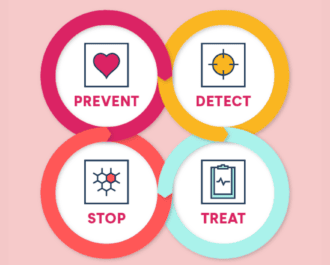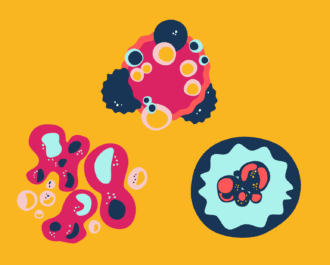
Collectively, breast and prostate cancers are the second biggest cancer killer in Australia. Breast and prostate cancers may not seem as though they’d have much in common, particularly as they are found in different organs and, predominantly, different genders.
However, these two cancers share similarities at a genetic level. The development and growth of both cancers are in most cases dependent on sex hormones (estrogens from the ovary in women and androgens from the testes in men). In cancer, these hormones switch from their usual job as ‘good players’ that promote normal tissue development to ‘bad players’ that stimulate the growth and spread of cancer cells.
The knowledge that sex hormones drive these cancers was a major breakthrough and led to hormonal deprivation therapy which has saved many lives. Indeed, hormone deprivation therapy has been the mainstay of treatment for breast and prostate cancers that have spread to other vital organs (i.e. metastasised) for more than 70 years. Hormone deprivation therapy is primarily comprised of two different treatment options: eliminating the production of ovarian or testicular hormones in women and men (ie estrogen, androgen) or blocking the receptors (ie estrogen receptors, androgen receptors) that transmit the actions of these hormones in the breast and prostate cancer cells.
However, with thousands of women and men still dying from breast and prostate cancers each year, largely due to the development of resistance to hormone deprivation therapy, improvements in treatment are sorely needed.
A joint approach to funding research
The National Breast Cancer Foundation has joined forces with the Movember Foundation to fund an innovative collaborative research project led by Professor Wayne Tilley at the University of Adelaide that is taking a new approach to the treatment of breast and prostate cancer.
“This project brings many of the ideas and discoveries that have occurred over the last 20 years in both mine and my colleagues’ laboratories into one major collaborative project,” says Professor Wayne Tilley.
“The joint funding from these two cancer foundations gives our team a unique opportunity to focus on an innovative approach to treat both cancers that we believe will be more effective and also has the potential to reduce the undesirable side effects associated with current hormone therapies.” says Professor Tilley.
Current treatments have nasty side effects
While many women and men have benefited from treatments which deprive the body of the hormones that drive breast and prostate cancers, they can also experience severe side effects.
“Men and women often experience undesirable side-effects of hormone deprivation therapy, including joint pain, loss of libido, impairment of cognitive function, early menopause in women and erectile dysfunction in men. Consequently, they stop taking the drugs, which in turn compromises their treatment outcomes. This puts them at increased risk of their cancer returning,” says Professor Wayne Tilley.
Both cancers can become resistant to hormone therapy
Approximately 70 per cent of breast cancers and almost 100 per cent of prostate cancers are driven by the activation of estrogen and androgen receptors, respectively.
Of the approximately 6000 women and men expected to die of breast and prostate cancer in Australia this year, almost all of these deaths will be due to the development of metastatic disease that is resistant to treatments that target these receptors.
Unfortunately, current methods of targeting these hormone-sensitive cancer cells consist of inhibiting the activity of the estrogen and androgen receptors. The cancers don’t like being deprived of hormones and develop innovative ways to become resistant to these treatments; this can include alterations to the receptors that enable them to drive cancer growth independently of sex hormones. Additionally, depriving the body of estrogen and androgen makes women and men suffer even more severe side-effects.
Consequently, a new approach is needed to outsmart these cancers rather than just eliminate the sex hormones from the body.
A new research strategy
Hormone deprivation therapy has benefited many women and men over the past decades. However, it has become increasingly evident to clinicians, researchers, and pharmaceutical companies that a completely new approach is essential to overcome treatment resistance and further improve the outcomes of people with breast or prostate cancer. In short, it’s time for a new way of thinking.
Professor Wayne Tilley is investigating whether, as an alternative to depriving the body of hormones and completely blocking the hormone receptors, the receptors can instead be reprogrammed to return to their normal operational state in non-malignant tissues.
“Rather than persevering with developing variations of the same approach to treatment that we’ve used for the past 70-100 years and which will at best yield incremental improvements, we need to step back and look for completely new and more effective ways to treat breast cancer and prostate cancer,” says Professor Tilley.
Professor Tilley’s outstanding international research team proposes a ground-breaking new treatment strategy that aims to rehabilitate rather than abolish the offending hormone receptors that drive breast and prostate cancer, essentially changing them from stimulating tumour growth to promoting a benign or indolent state.
Importantly, the researchers believe that this can be achieved by repurposing existing drugs that have milder side effects and are already approved for other medical purposes. This could vastly increase the speed of translating findings from the laboratory to the clinic.
This exciting strategy has strong potential to significantly increase the lifespan of patients with therapy-resistant breast or prostate cancer. Another possible benefit of this approach is improved quality of life.
“We already have proof-of-principle that this strategy can work in hormone-sensitive breast cancer, with clinical trials starting this year to test this concept. In this new grant, we will develop novel ways to reprogram hormone receptors to better control the growth of lethal, treatment resistant breast and prostate cancers. By being smarter in learning from the discoveries in each cancer we can fast-track advances and outcomes in both diseases,” says Professor Tilley.
Benefits of this research
This pioneering work has potential to open new treatments options for breast and prostate cancer and pave the way for better outcomes for men and women around the world.
Importantly, while Professor Tilley’s research approach is focused on breast and prostate cancer, there may be the possibility to apply it to other types of cancers in the future.
More News Articles
View all News



